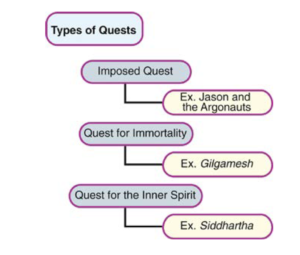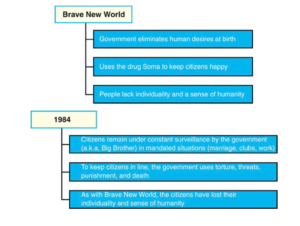Major Literary Themes & Archetypes
Objective
This time we will be reviewing literary themes. The lesson will cover mythical themes that include quest, creation, and naming myths, as well universal themes common to various texts.
Previously Covered:
- In the previous lesson we examined major American literary movements.
The Myth
Our initial discussion will cover universal mythical themes such as creation, quest, and naming.
The following are some things you should know about myths in general:
- Myth originally meant “fable,” “tale,” or “talk,” but has come to mean a fiction that conveys a psychological truth.
- Although myths are no longer taken literally, scholars and teachers often look to them for hidden meanings or lessons.
- Myths explain how something came into existence and many concern themselves with primitive explanations of the natural order.
Creation Myths
There are three major types of creation myths:

Quest Myths
Quest myths usually involve a young person who must make a journey of some kind. As the youth attempts to make a path for himself or herself, obstacles and tests litter the path as he or she seeks some kind of personal or spiritual development. The most difficult journey of all is the one to the land of the dead.
We will focus on three major quests in the mythological world:

Naming Myths
In many myths, the name can be very symbolic or integral to the story. The following is an example of the naming process in myths and how those names can be influential:
- Echo: The goddess Hera, jealous that Zeus had paid attention to Echo, punished her. Echo’s punishment was that she could only repeat the last words anybody said.
- Echo fell in love with Narcissus but could only repeat his words. Aphrodite made him see his reflection in the pond where he promptly fell in love with himself. He eventually died and turned into a flower so Echo could have him near always. This is also where we get the flower, Narcissus, and the term, narcissistic.
Shared Themes in Major Texts
A novel or play may contain several themes, but a few universal themes are present in major literary works spanning several centuries and countless cultures. Here is a brief list of major themes followed by the texts that include them:
Fate – Fate is a common theme in novels, especially in classic literature. It toys with the idea that who you are and who you are meant to be might already be predestined. Two works that use the theme are Moby Dick (written by Herman Melville) and Macbeth (written by William Shakespeare). While the two works were written in different eras, the theme still rings true.
- Moby Dick: Fate plays an important role in the novel, as Captain Ahab uses the sailors’ staunch belief in fate to make them believe that their destiny is to catch Moby Dick. The question raised in the novel is whether the sailors chose their fate or if catching Moby Dick was truly their destiny.
- Macbeth: In this play, fate is an example of a self-fulfilling prophecy. Three witches predict Macbeth’s future. When the witches’ first sign comes true, he believes the rest of their prediction — to be king — must be his fate. He chooses to follow the fate set before him as his destiny. Again the play questions whether the character chooses his fate or does it choose him?
Love – Love is one of the most common themes used in literature. It can be life-giving but also lethal; Shakespeare’s Romeo and Juliet and Jane Austen’s Pride and Prejudice exemplify this dichotomy.
- Romeo and Juliet — Romeo and Juliet experience an all-consuming love for each other, but because of their feuding families they are prohibited from expressing it. Eventually, the two decide they cannot live apart, and death seems the only answer. The all-consuming love does, indeed, end up consuming them.
- Pride and Prejudice —Elizabeth and Darcy prohibit themselves from loving one another. Darcy is blinded by his superior social standing and doesn’t see Elizabeth’s virtues. Elizabeth is turned off by his snobbery and refuses to look past this superficial trait. With time and coincidence, Elizabeth and Darcy begin to see each other in a new light and begin to live a life they didn’t previously think possible.
Power – The lure of power and how it is wielded has been the motivating theme behind many great novels. For our purposes, we will examine two novels dealing with power in government: Aldous Huxley’s Brave New World and George Orwell’s 1984. While both novels feature governments that maintain total control over their citizens, the manner of presentation is vastly different.

Individuality/Alienation – The feeling of being part of humanity yet isolated or alienated from it is also a universal theme. Two texts that bring this theme to the foreground are Kate Chopin’s The Awakening and Fyodor Dostoevsky’s Crime and Punishment.
- In The Awakening, the main character, Edna Pontellier, realizes the consequences of going against the norms of society. When she “awakens” to her own identity as a woman, her individuality causes her to be alienated. Her “awakening” leads to total isolation from both society and her family.
- Unlike Edna, Crime and Punishment’s Raskolnikov is already aware of his identity as a citizen of Russia. However, he feels superior to the rest of society and feels he must separate himself from those of lesser quality. He voluntarily alienates himself, only to find in the end that he wishes for the company of those he previously disdained.
Question
Which of the following is an example of a myth involving an imposed quest?
- Narcissus and Echo
- The Minotaur
- Jason and the Argonauts
- Cupid and Psyche
Reveal Answer
The answer is C. The imposed quest requires that a human, god, or goddess makes a journey not of his or her own volition. In this case, Jason was ordered by the king to retrieve the Golden Fleece. Jason did not choose to enter into the quest, but he was not in any position to decline the king’s order. He set out with fifty heroes known as the Argonauts.
Back to Top
 username@email.com
username@email.com


